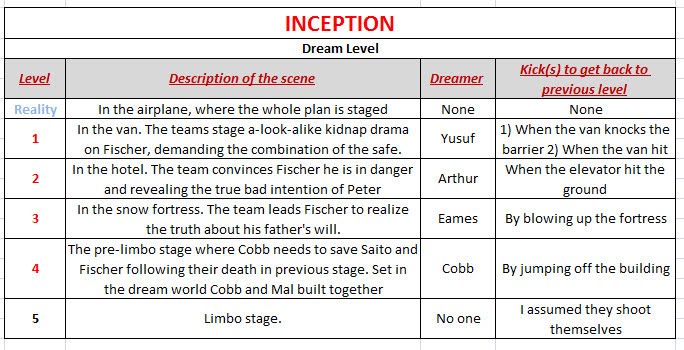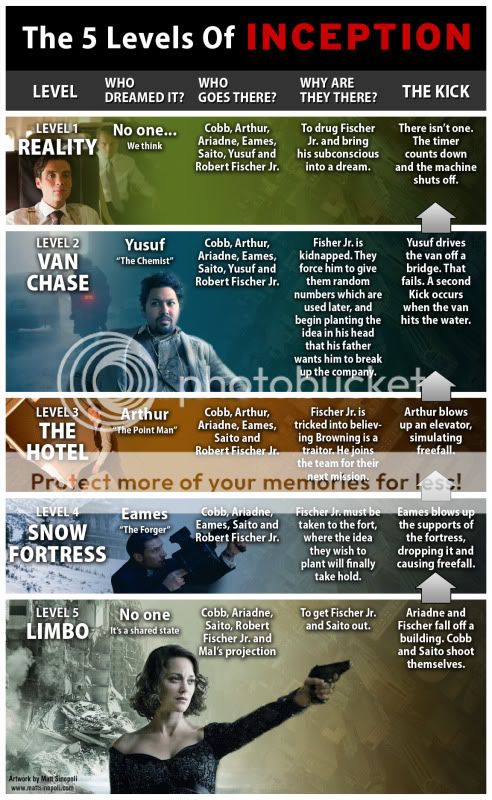hey folks, i watched inception nearly 2 weeks ago. but i only completed the writing of my review over the past weekend.
i'm kinda late to this thread, so most aspects have already been discussed at length, but i just wanted to chime in with my own thoughts about this remarkable film. it's pretty long, since it was meant as a proper critical analysis (i used to write for a national newspaper back home). check it out if u've got some time to spare...
____________________
INCEPTION REVIEW
Organic.
That’s the word that came to my mind after it had spent some time processing Christopher Nolan’s “Inception”.
The British auteur is often criticized for his cold, aloof, mechanical approach to his films. In that respect, he’s been compared to legendary director Stanley Kubrick. Precisely conceived and methodically constructed, Nolan’s body of work thus far has always been intellectually rewarding but seldom emotionally fulfilling. In short, the man puts head above heart.
Looks like he’s finally broken that trend. “Inception” has a lot of heart, dark as it may be. It is still first and foremost a cerebral experience, but this time there is a depth of feeling only fleetingly present in previous films. More importantly, the emotions of this film feel naturally woven into the narrative. Perhaps this is a progression of Nolan’s favoured (and recurring) theme: loss of control. In “The Dark Knight” it was embodied by the anarchistic Joker, in “The Prestige” it was the escalating feud between two magicians, and in “Memento” it was the protagonist’s amnesia. All those films dealt with emotions like hopelessness, anger, and nostalgia. But they were not central to the story, except “Batman Begins”, which was all about fear. But that story wasn’t originated by Nolan.
“Inception” plays a new riff on an old motif. How do you maintain control if you’re in a place where you have almost no control: someone else’s dream? And what happens when your heart keeps betraying your mind in a place like this? It’s a very intriguing premise, and the first time Nolan has so organically married the workings of the human mind with the workings (and failings) of human emotion.
The carrier of this premise is Dom Cobb, played by Leonardo DiCaprio. For the uninformed, Cobb is an extractor, a thief who specializes in stealing ideas from other people’s dreams. He is the best at it. Except for one small problem. Wracked with guilt after the death of his wife, she continues to pop up in his subconscious as a ghost that sabotages his dream-time incursions. It’s no coincidence that she’s named Mal, as in malfunction. She is the personification of what’s gone wrong with Cobb. She is also a terrific narrative device for the film.
There are actually two stories being told. One is that of a traditional crime flick where the goal is to plant an idea, or inception, in the mind of a billionaire industrialist’s heir. The other is Cobb’s story. It’s a testament to Nolan’s skill as a writer that he managed to layer Cobb’s personal tragedy on top of the overarching heist plot in a totally natural way. Too many films have tried, and failed, to incorporate a character’s past into the present plot. They usually felt contrived or unnecessary. Here, it’s organic. Essential.
In order to successfully perform inception, the team must go deep enough into the subject’s mind. And that means dreams within dreams. It’s a really cool concept, especially in its rules. In a dream, time passes faster. So every subsequent level of dream is an exponential increase in time. Seconds in the real world mean minutes in the dream, and hours in the dream inside of it, and so on. This allows Nolan all sorts of crazy set-ups, like where a moment of falling translates into an entire sequence of weightlessness. By creating a world where the rules operate on such a different logic, the challenges faced by the characters seem fresh and unpredictable. There were scenes where I had genuinely no idea how things would turn out. That is rare, in this day and age where we have seen it all.
What is expected however, is the quality of the performances. Nolan has built a reputation as an actor’s director. Fresh off “Shutter Island”, DiCaprio essays another fractured psyche trying to hold it all together. Unlike the Scorsese pic where he was required to play it really frayed and frazzled, here he is almost calm in his emotional disintegration.
Nolan coaxes a slow-burn performance out of DiCaprio, and it works. A plot as complex as Inception’s requires a measured pacing of all the information presented to the audience. For the exposition of how the dream world operates, he has audience surrogate Ariadne, played by Ellen Page. Her own gradual immersion eases us into the hows, the whats and the whys. Similarly, in getting to know the whos, Nolan lets us follow DiCaprio into the void, step by step. It’s a great example of script and acting working in tandem to paint a complete characterisation. When Cobb finally comes to the end of his emotional journey with Mal, the scene(s) are all the more poignant and powerful. Marion Cotillard plays it dark, unhinged and lethal as Mal, and her scenes with DiCaprio have a vitality I’ve seldom seen in on-screen couples. She’s always a pleasure to watch, both as a performer and as eye candy.
Converging thematically with his own personal story is Robert Fischer Jr (Cillian Murphy), the heir whose mind the team has hijacked. Nolan sneakily plants subtle visual cues throughout the film that pay off very effectively at the climax. Murphy’s detached demeanor for most of the film makes Fischer’s emotional catharsis even more pronounced. It parallels Cobb’s own release in a way that feels satisfying and resolved. Another solid showing for the Irish actor.
In fact, the whole cast is superb. Joseph Gordon-Levitt is one of my favourite young actors today. It’s never easy doing “subtle”, but Levitt always pulls it off. There is a bookish sexiness in how he quietly but confidently gets the team out of trouble after trouble. On a purely entertainment level, I loved the character of Eames, played by Tom Hardy. He is full of easy charisma and can-do bravado. It’s a more cultured, less showy version of his breakthrough role in “Bronson”. I wanted a whole movie featuring just him and Levitt’s Arthur!
Ellen Page continues to show why she is the best young actress of her generation. She brings a combination of naiveté and fierce intelligence to Ariadne. Page is saddled with the thankless role of having stuff explained to her throughout the film, but she sells it with the just the right amount of incredulity.
Ultimately, what’s impressed me most is how incredibly rich and nuanced “Inception” is as an experience. The movie has multiple levels, but not only in a literal sense. Taken on an entirely superficial level, it is a razor-sharp action flick with huge action beats and broad humour. My only criticism of the action is the fight staging and editing, still Nolan’s weak spot. Enhancing the viewing experience is Hans Zimmer’s brilliant score: propulsive and emotive in all the right places.
The real pleasure is to be found thematically. “Inception” has so many layers that you could watch it repeatedly and have a different take out every time. (Or, you could get hopelessly lost!) On the surface, there is the basic theme of ideas and their power to create or destroy. Fischer and Mal’s respective fates are the result of these opposing ends. Then there is the aforementioned Nolan mainstay of a man struggling internally amidst external adversity. Technically though, this time the external threats are actually internal as well, since everything takes place inside the mind.
Beneath that is a running motif about mazes. I’m not just talking about the stunning, paradoxical imagery presented on screen. The plot structure itself is like an elaborate puzzle, with one way in and one way out. The name Ariadne is a reference to the princess of Greek mythology who led Theseus out of the Minotaur’s labyrinth. In the movie she is the voice of reason for Cobb, helping him escape his past.
The movie is also about taking leaps of faith. We see faith in friends rewarded while blind faith has its repercussions. Spiritually-inclined viewers might also read more heavily into references to penance, purgatory and the after-life. On the flip side, armchair psychoanalysts will have a field day picking apart all the archetypes, dream symbolism and perceptions of reality. Cobb himself is a glorious train-wreck of the id with the super-ego. At least that’s how I saw him.
However, the thing that has gotten most people talking about the most, is the ending. The final shot of the film is so simple, but is oh-so loaded. By cutting that scene just a few seconds early, Nolan has performed a mindf@#*k of the highest order. Audiences are asking, “Does it invalidate the entire 140 minutes before? Or does it validate everything?”
At the time of writing this, the film has only been on release for 2 weeks. It has already generated intense analysis and debate all over the world. Film, like any other artform, is meant to elicit a response, either emotional or intellectual. But today’s audiences are so used to being spoon-fed with the literal and the convenient. All too often, we are handed easy answers. When a film like “Inception” comes along, and challenges us to form our own opinions, it’s very energising.
I’m not going to give you my take on what the ending means. Nolan didn’t. He knew full well what he wanted to say, and what he wanted to accomplish. He just wants us all to have our own say too. That approach to filmmaking is one I respect the most. Because he respects us. We, the audience are making the movie in our heads, long after the production has wrapped. It is inclusive and collaborative.
It’s organic.
And for that, I salute “Inception” as a true modern-day classic.


















